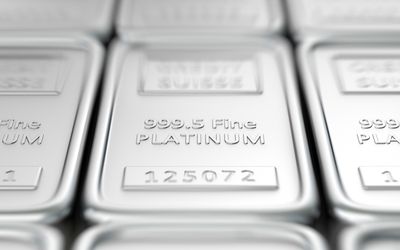 ThE JSE’s gauge of platinum mining stocks fell to the lowest since July 2013 as the world’s three biggest producers struggle to recover from a five-month strike and as metal prices retreated.
ThE JSE’s gauge of platinum mining stocks fell to the lowest since July 2013 as the world’s three biggest producers struggle to recover from a five-month strike and as metal prices retreated.
The six-member FTSE/JSE Africa platinum mining index fell 3.5% to 39.11 points by the close in Johannesburg, a third day of declines. More than two times the three-month daily average of shares were traded, while the measure’s 14-day relative strength index fell to 20.4, the lowest since August 2011.
Spot platinum retreated 12% from this year’s peak reached on July 10, about two weeks after a stoppage by about 70,000 workers ended.
“In addition to the lost production and the cost problems, you’ve also got a weak platinum price,” Garth Mackenzie, founder of Traderscorner.co.za, said yesterday. “The palladium price has also been breaking lower recently, that’s also bad news for these stocks.”
Producers including Anglo American Platinum (Amplats), Lonmin and Impala Platinum, which supply more than two-thirds of the world’s mined platinum, are reviewing growth plans and are putting mines up for sale after the strike over wages. Impala was the worst performer on the index, retreating 4.3% to R86.62.
Amplats fell 3.3% to R385.80. None of the gauge’s members gained.
The spot price of palladium fell 1.1% to $801.75/oz, while platinum dropped 0.6% to $1,328.63/oz. The metals are used to make catalytic converters, which curb harmful emissions from cars. Palladium is mostly used in gasoline vehicles and platinum is favoured for diesel types.
Platinum producers enforcing contracts with fixed delivery amounts on their customers had caused an oversupply of the metal, René Hochreiter and Michael Kavanagh of Noah Capital Markets said in a note last week. “Being forced to take more metal than they need, the customers have been offloading excess metal to investors for years.”
Amplats plans to sell four mines and possibly stakes in two joint ventures, while Impala is reviewing capital expenditure projects because of expected lower cash flows. Lonmin may cut jobs as it reviews operations.
Lonmin offered the best prospect of a rebound once production normalised and prices recovered, Mr Hochreiter and Mr Kavanagh said. “Its share price has been the most negatively affected.”
Lonmin stock has fallen 31% this year, the biggest decliner on the platinum index.
Other precious metals and their producers also suffered yesterday. Gold futures fell to the lowest in eight months and silver extended a slump to the cheapest in four years as the dollar’s rally damped demand for the precious metals as alternate investments.
“People want the dollar and not gold,” Lance Roberts, who helps oversee $600m as chief strategist for STA Wealth in Houston, said in a telephone interview yesterday.
“Gold will continue to remain out of favour as people are expecting (US interest) rates to rise.”
The fall in commodity prices sent emerging-market stocks down to their lowest in 15 weeks.
“We’re seeing a kind of mental capitulation by investors,” Jon Bergtheil, an analyst at Citigroup in London, said by telephone yesterday. “The fundamentals are getting worse.
“The strong dollar, because commodities are measured in dollars, is normally bad news for commodities.”
Commodities are 12% lower this quarter, set for the biggest such loss since the financial crisis in 2008.
China’s Finance Minister Lou Jiwei said in a statement at the weekend that growth in Asia’s largest economy faced downward pressure.
“We are looking at a downturn right now as China continues to disappoint,” Justin Smirk, a senior economist at Westpac Banking Corporation, said yesterday by phone from Sydney.
“It’s about the uncertainty that people are worried about.”
Bloomberg


